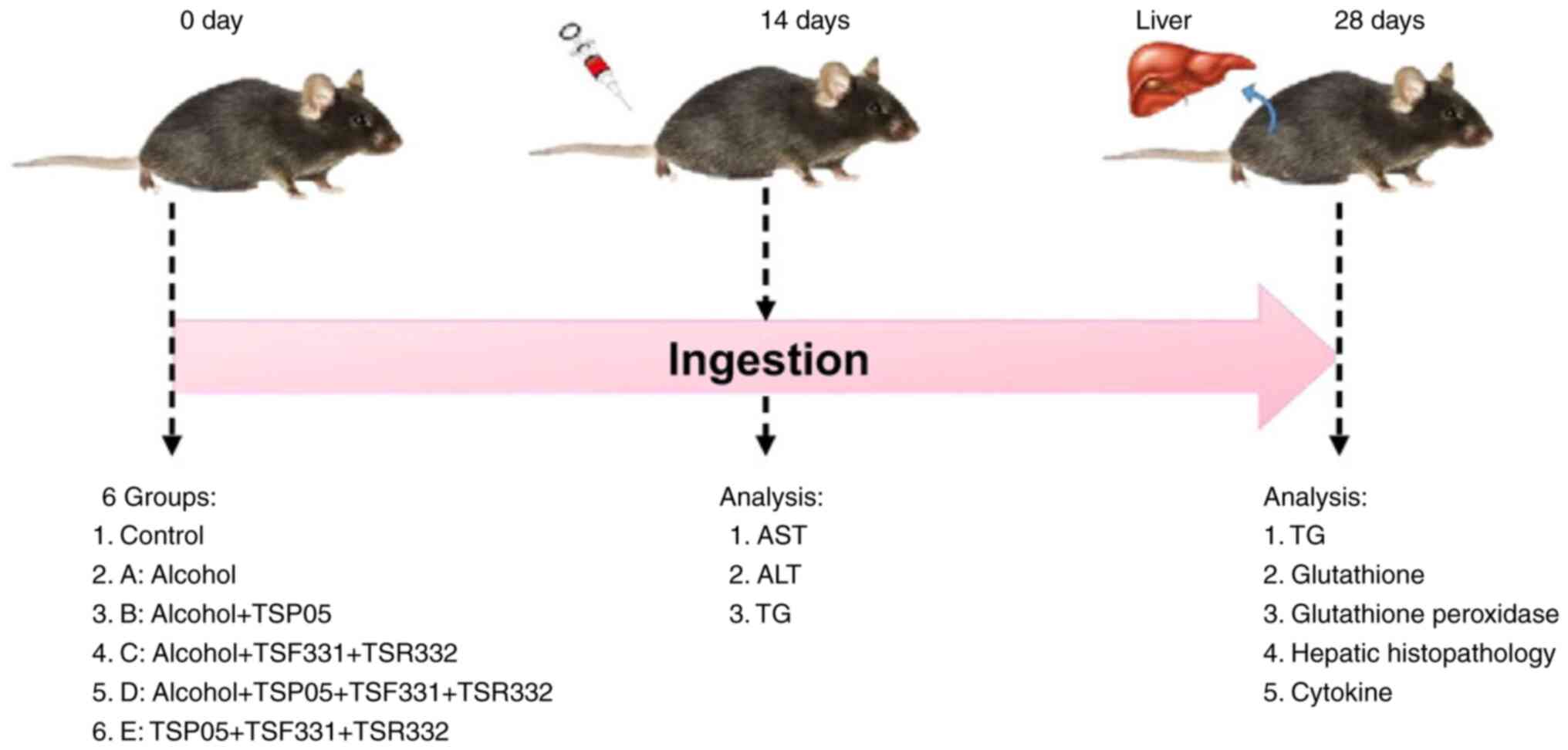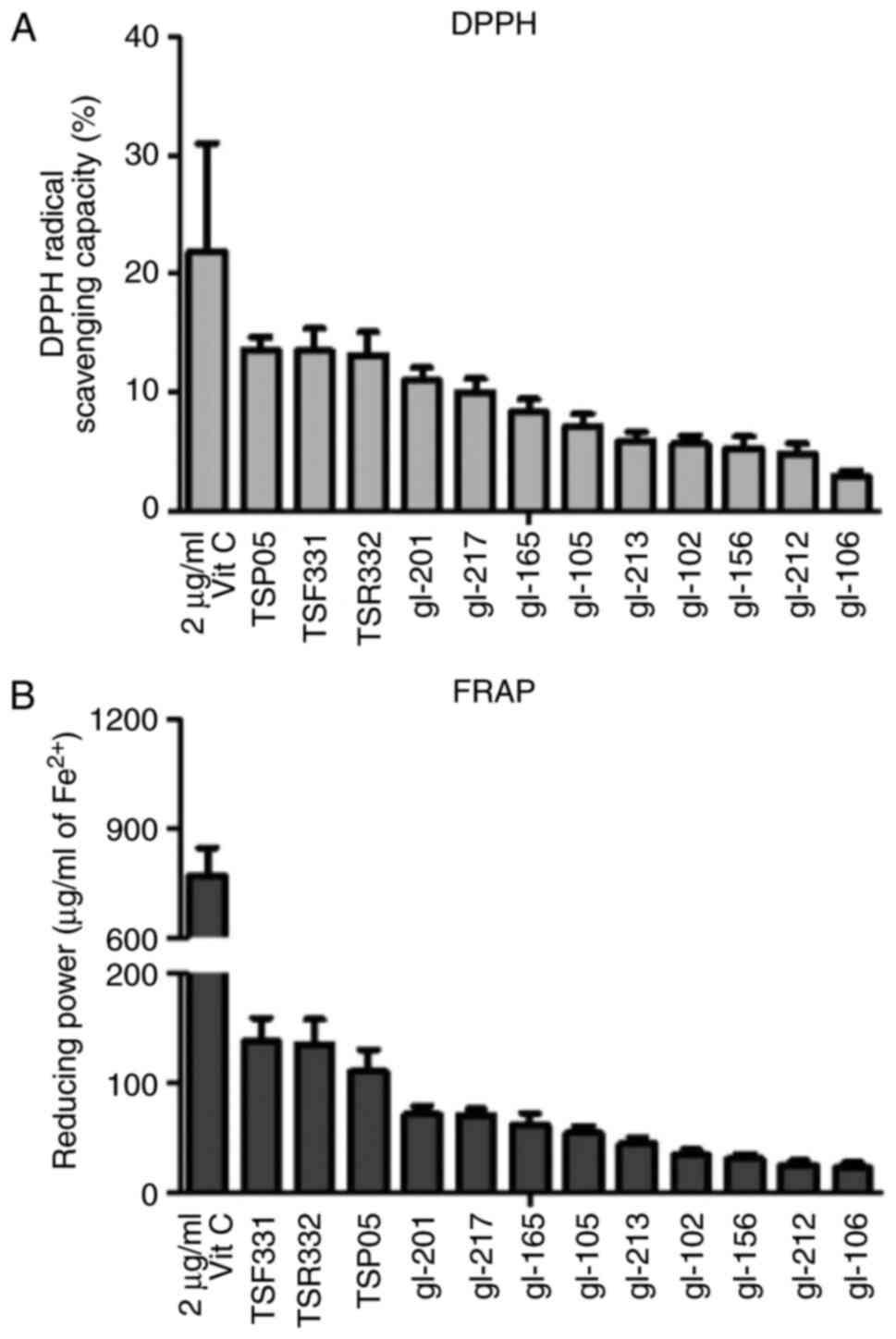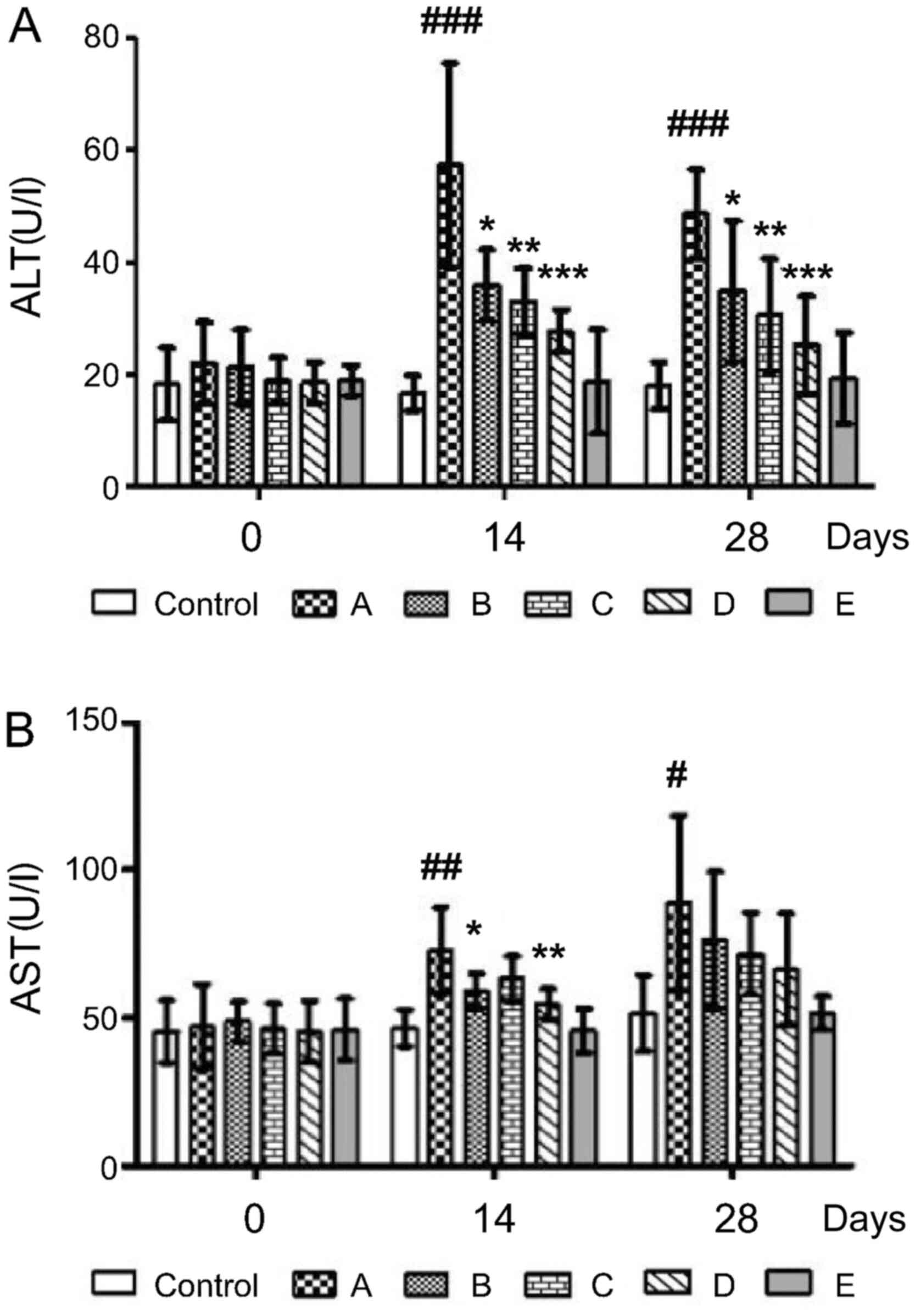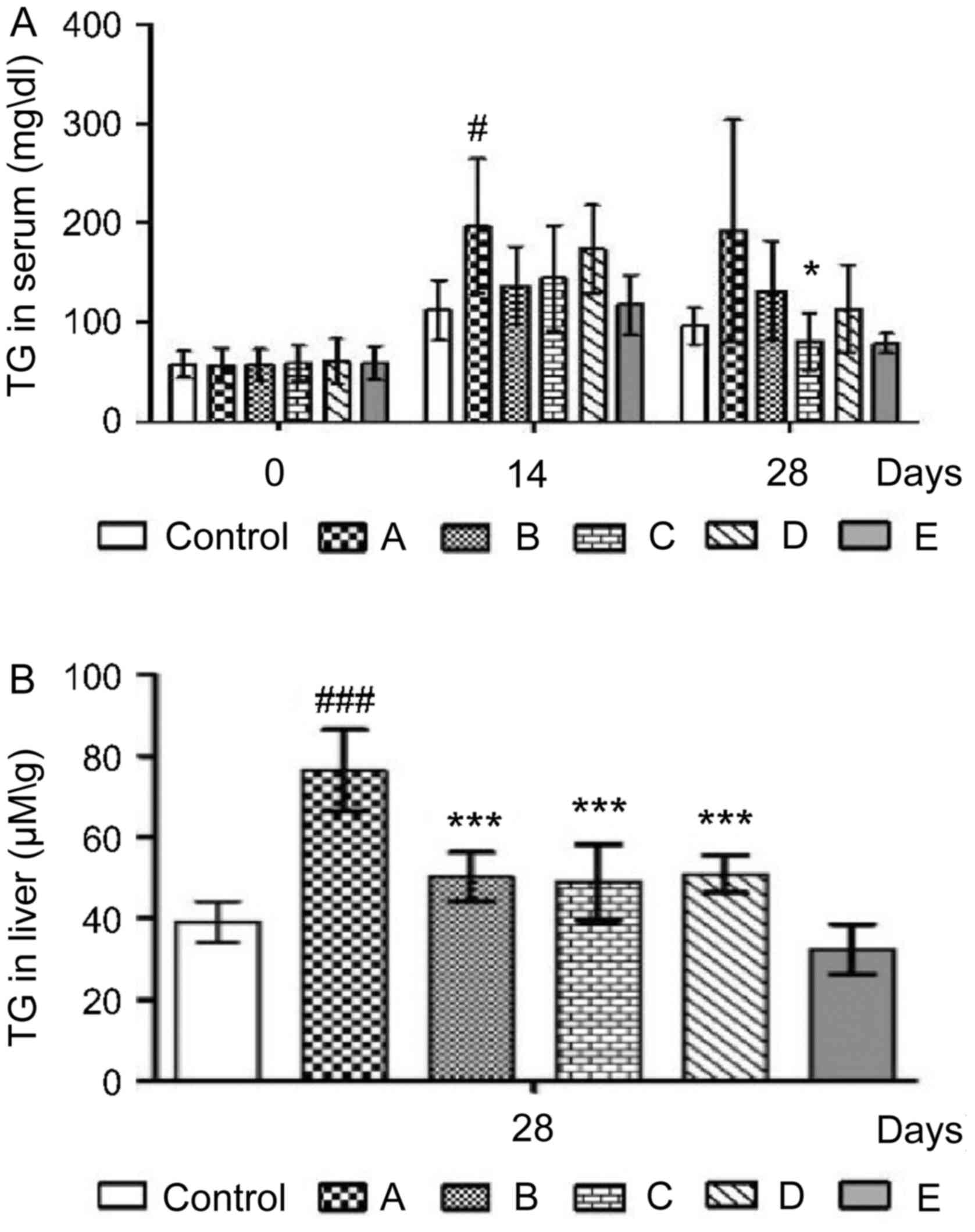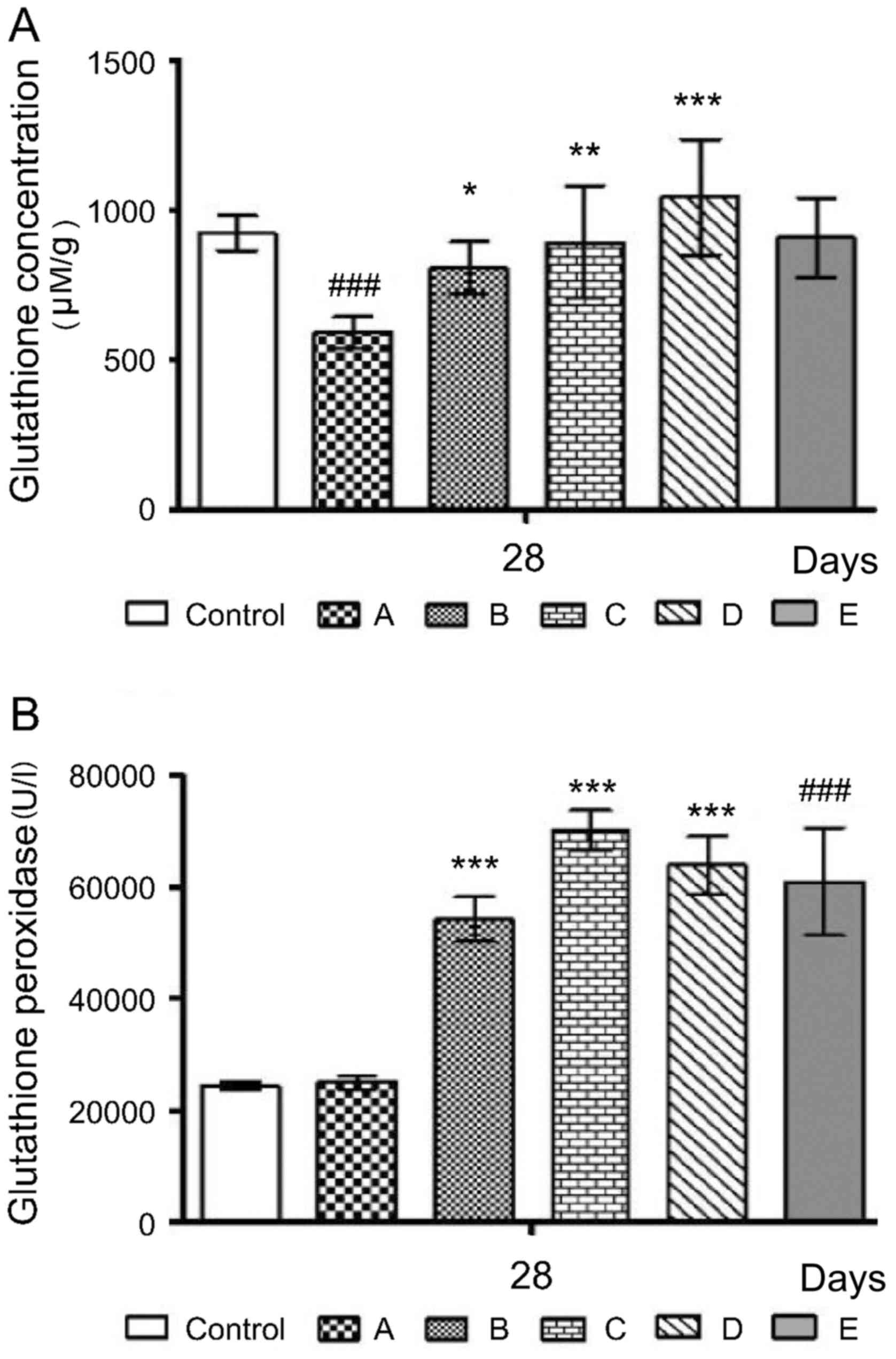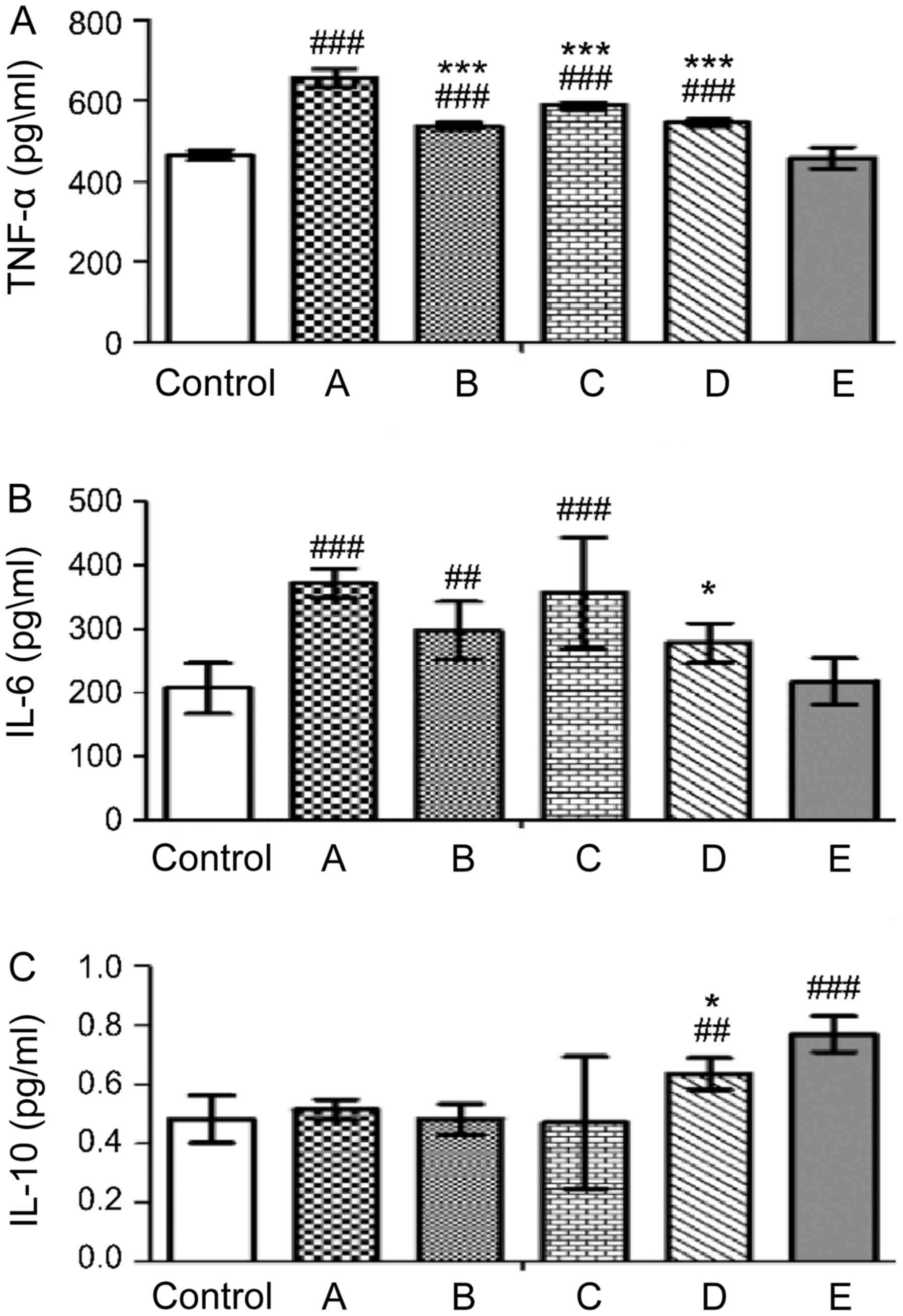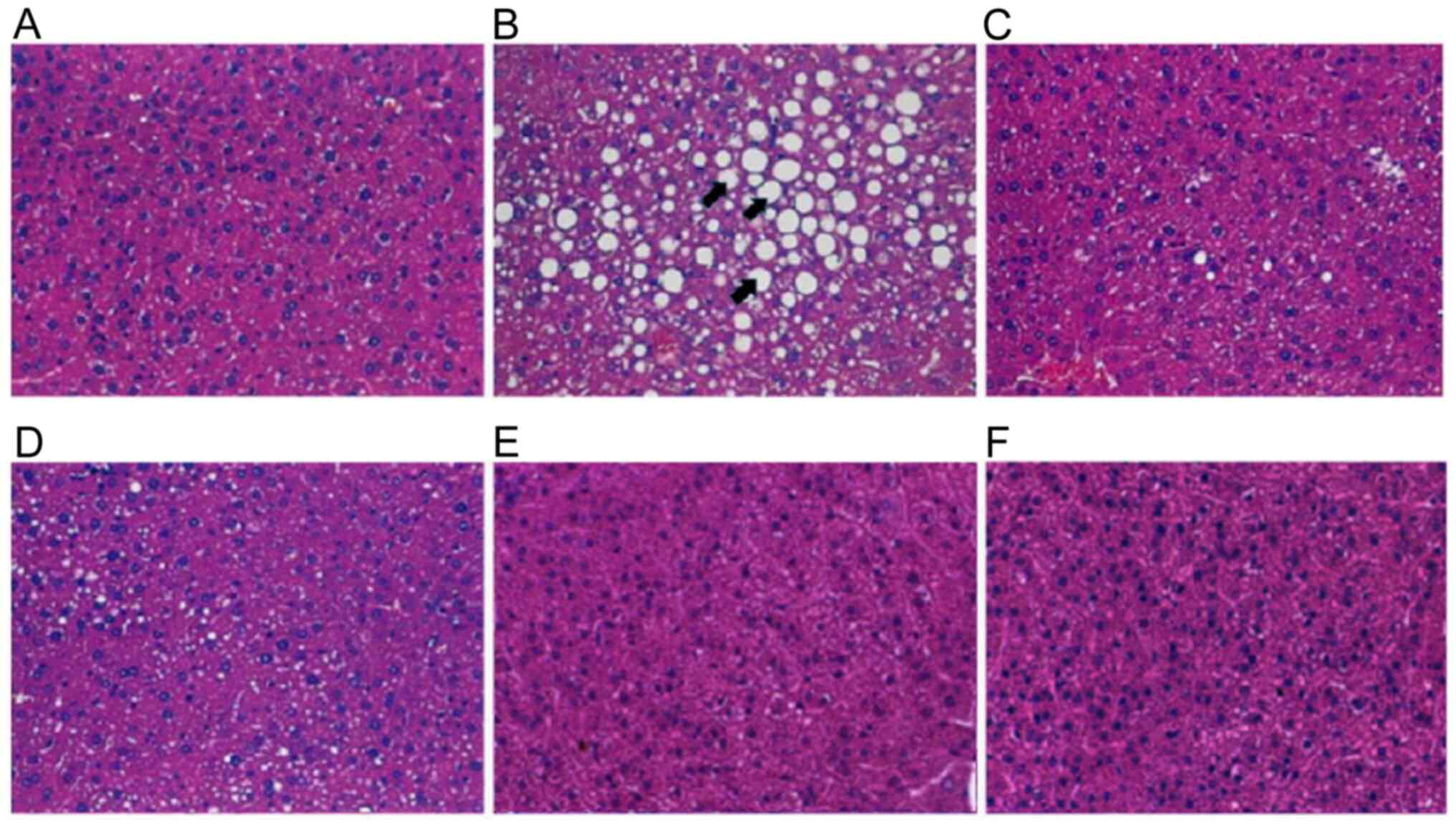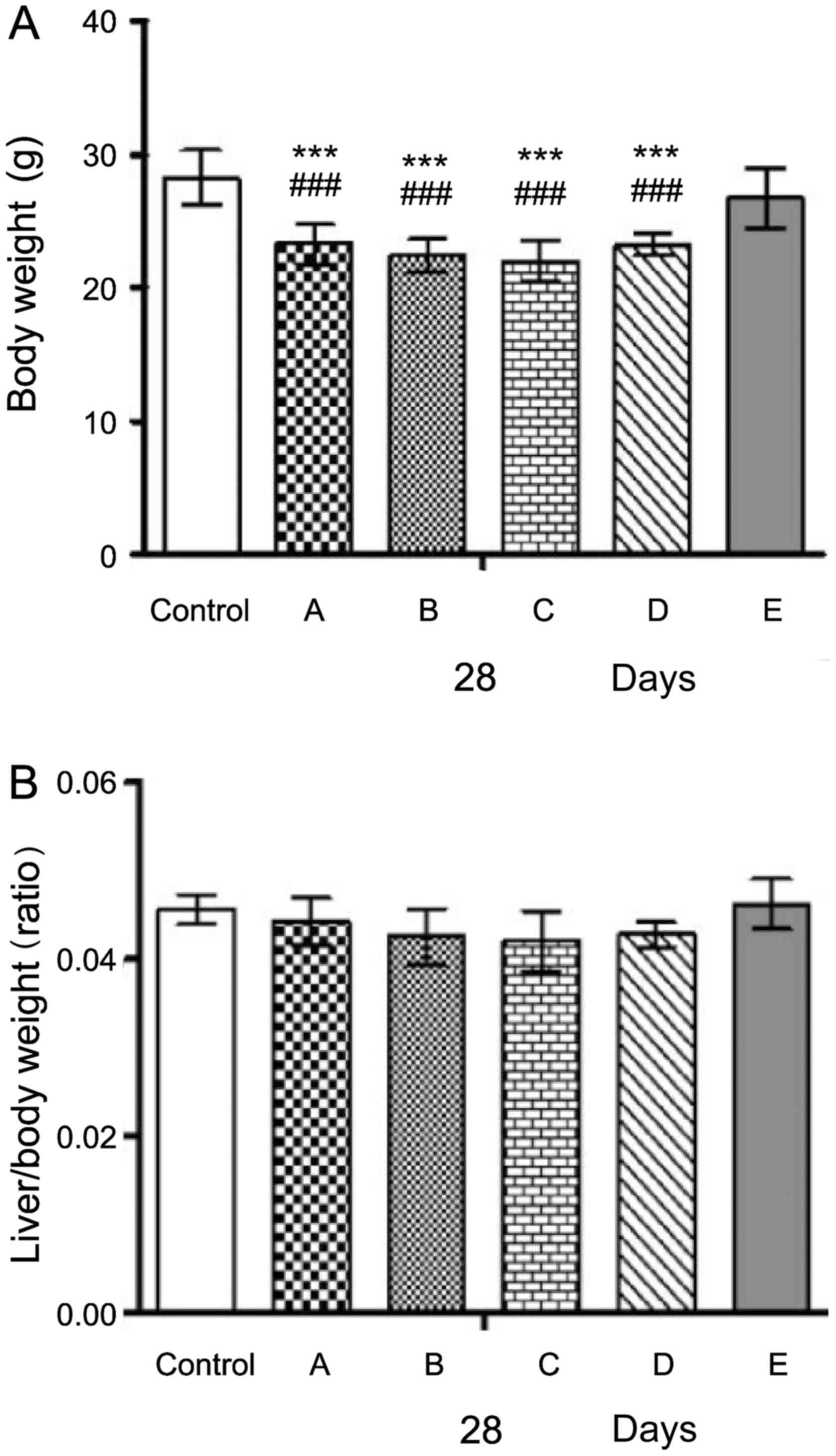|
1
|
Rehm J and Shield KD: Global
alcohol-attributable deaths from cancer, liver cirrhosis, and
injury in 2010. Alcohol Res. 35:174–183. 2013.PubMed/NCBI
|
|
2
|
World Health Organization: Global status
report on alcohol and health 2014. http://www.who.int/substance_abuse/publications/global_alcohol_report/msb_gsr_2014_1.pdf.
|
|
3
|
World Health Organization: Global status
report on alcohol and health 2018. https://apps.who.int/iris/bitstream/handle/10665/274603/9789241565639-eng.pdf.
|
|
4
|
Bajaj JS: Alcohol, liver disease and the
gut microbiota. Nat Rev Gastroenterol Hepatol. 16:235–246.
2019.PubMed/NCBI View Article : Google Scholar
|
|
5
|
Lieber CS: Role of oxidative stress and
antioxidant therapy in alcoholic and nonalcoholic liver diseases.
Adv Pharmacol. 38:601–628. 1996.PubMed/NCBI View Article : Google Scholar
|
|
6
|
Li F, Duan K, Wang C, McClain C and Feng
W: Probiotics and alcoholic liver disease: Treatment and potential
mechanisms. Gastroent Res Pract. 2016(5491465)2016.PubMed/NCBI View Article : Google Scholar
|
|
7
|
Gu Z, Liu Y, Hu S, You Y, Li W and Wang Y:
Probiotics for alleviating alcoholic liver injury. Gastroent Res
Pract. 2019(9097276)2019.PubMed/NCBI View Article : Google Scholar
|
|
8
|
Schnabl B and Brenner DA: Interactions
between the intestinal microbiome and liver diseases.
Gastroenterology. 146:1513–1524. 2014.PubMed/NCBI View Article : Google Scholar
|
|
9
|
Zhou Z and Zhong W: Targeting the gut
barrier for the treatment of alcoholic liver disease. Liver Res.
1:197–207. 2017.PubMed/NCBI View Article : Google Scholar
|
|
10
|
Kirpich IA, Solovieva NV, Leikhter SN,
Shidakova NA, Lebedeva OV, Sidorov PI, Bazhukova TA, Soloviev AG,
Barve SS, McClain CJ and Cave M: Probiotics restore bowel flora and
improve liver enzymes in human alcohol-induced liver injury: A
pilot study. Alcohol. 42:675–682. 2008.PubMed/NCBI View Article : Google Scholar
|
|
11
|
Forsyth CB, Farhadi A, Jakate SM, Tang Y,
Shaikh M and Keshavarzian A: Lactobacillus GG treatment
ameliorates alcohol-induced intestinal oxidative stress, gut
leakiness, and liver injury in a rat model of alcoholic
steatohepatitis. Alcohol. 43:163–172. 2009.PubMed/NCBI View Article : Google Scholar
|
|
12
|
Wang Y, Gao J, Zhang J and Hu Y:
Lactobacillus rhamnosus B10 treatment ameliorates
ethanol-induced mouse liver injury by antioxidant pathways. Food
Sci. 33:270–274. 2012.
|
|
13
|
Hiraishi A: Direct automated sequencing of
16S rDNA amplified by polymerase chain reaction from bacterial
cultures without DNA purification. Lett Appl Microbiol. 15:210–213.
1992.PubMed/NCBI View Article : Google Scholar
|
|
14
|
Lane DJ: 16S/23S rRNA sequencing. In:
Nucleic acid techniques in bacterial systematics. Stackebrandt E
and Goodfellow M (eds.) John Wiley and Sons, New York, pp115-175,
1991.
|
|
15
|
Weisburg WG, Barns SM, Pelletier DA and
Lane DJ: 16S ribosomal DNA amplification for phylogenetic study. J
Bacteriol. 173:697–703. 1991.PubMed/NCBI View Article : Google Scholar
|
|
16
|
Xing J, Wang G, Zhang Q, Liu X, Gu Z,
Zhang H, Chen YQ and Chen W: Determining antioxidant activities of
lactobacilli cell-free supernatants by cellular antioxidant assay:
A comparison with traditional methods. PLoS One.
10(e0119058)2015.PubMed/NCBI View Article : Google Scholar
|
|
17
|
Benzie IFF and Strain JJ: Ferric
reducing/antioxidant power assay: Direct measure of total
antioxidant activity of biological fluids and modified version for
simultaneous measurement of total antioxidant power and ascorbic
acid concentration. Methods Enzymol. 299:15–27. 1999.PubMed/NCBI View Article : Google Scholar
|
|
18
|
Hyronimus B, Le Marrec C, Hadj Sassi A and
Deschamps A: Acid and bile tolerance of spore-forming lactic acid
bacteria. Int J Food Microbiol. 61:193–197. 2000.PubMed/NCBI View Article : Google Scholar
|
|
19
|
Hassanzadazar H, Ehsani A, Mardani K and
Hesari J: Investigation of antibacterial, acid and bile tolerance
properties of lactobacilli isolated from Koozeh cheese. Vet Res
Forum. 3:181–185. 2012.PubMed/NCBI
|
|
20
|
Lieber CS and DeCarli LM: Liquid diet
technique of ethanol administration: 1989 update. Alcohol Alcohol.
24:197–211. 1989.PubMed/NCBI
|
|
21
|
Guo R and Ren J: Alcohol and acetaldehyde
in public health: From marvel to menace. Int J Environ Res Public
Health. 7:1285–1301. 2010.PubMed/NCBI View Article : Google Scholar
|
|
22
|
Tuma DJ and Casey CA: Dangerous byproducts
of alcohol breakdown-focus on adducts. Alcohol Res Health.
27:285–290. 2003.PubMed/NCBI
|
|
23
|
Li S, Tan HY, Wang N, Zhang ZJ, Lao L,
Wong CW and Feng Y: The role of oxidative stress and antioxidants
in liver diseases. Int J Mol Sci. 16:26087–26124. 2015.PubMed/NCBI View Article : Google Scholar
|
|
24
|
Mallikarjuna K, Shanmugam KR, Nishanth K,
Wu MC, Hou CW, Kuo CH and Reddy KS: Alcohol-induced deterioration
in primary antioxidant and glutathione family enzymes reversed by
exercise training in the liver of old rats. Alcohol. 44:523–529.
2010.PubMed/NCBI View Article : Google Scholar
|
|
25
|
Dey A and Lakshmanan J: The role of
antioxidants and other agents in alleviating hyperglycemia mediated
oxidative stress and injury in liver. Food Funct. 4:1148–1184.
2013.PubMed/NCBI View Article : Google Scholar
|
|
26
|
Pompella A, Visvikis A, Paolicchi A, De
Tata V and Casini AF: The changing faces of glutathione, a cellular
protagonist. Biochem Pharmacol. 66:1499–1503. 2003.PubMed/NCBI View Article : Google Scholar
|
|
27
|
Muthukumar K, Rajakumar S, Sarkar MN and
Nachiappan V: Glutathione peroxidase3 of Saccharomyces cerevisiae
protects phospholipids during cadmium-induced oxidative stress.
Antonie van Leeuwenhoek. 99:761–771. 2011.PubMed/NCBI View Article : Google Scholar
|
|
28
|
Nanji AA, Khettry U and Sadrzadeh SMH:
Lactobacillus feeding reduces endotoxemia and severity of
experimental alcoholic liver (disease). Exp Biol Med. 205:243–247.
1994.PubMed/NCBI View Article : Google Scholar
|
|
29
|
Banerjee A and Dhar P: Amalgamation of
polyphenols and probiotics induce health promotion. Crit Rev Food
Sci Nutr. 59:2903–2926. 2019.PubMed/NCBI View Article : Google Scholar
|
|
30
|
Cortés-Martín A, Selma MV, Tomás-Barberán
FA, González-Sarrías A and Espín JC: Where to look into the puzzle
of polyphenols and health? The postbiotics and gut microbiota
associated with human metabotypes. Mol Nutr Food Res.
64(e1900952)2020.PubMed/NCBI View Article : Google Scholar
|
|
31
|
Soto-Alarcon SA, Valenzuela R, Valenzuela
A and Videla LA: Liver protective effects of extra virgin olive
oil: Interaction between its chemical composition and the
cell-signaling pathways involved in protection. Endocr Metab Immune
Disord Drug Targets. 18:75–84. 2018.PubMed/NCBI View Article : Google Scholar
|
|
32
|
Valenzuela R, Illesca P, Echeverría F,
Espinosa A, Rincón-Cervera MA, Ortiz M, Hernandez-Rodas MC,
Valenzuela A and Videla LA: Molecular adaptations underlying the
beneficial effects of hydroxytyrosol in the pathogenic alterations
induced by a high-fat diet in mouse liver: PPAR-α and Nrf2
activation, and NF-κB down-regulation. Food Funct. 8:1526–1537.
2017.PubMed/NCBI View Article : Google Scholar
|
|
33
|
Hernández-Rodas MC, Valenzuela R,
Echeverría F, Rincón-Cervera MA, Espinosa A, Illesca P, Muñoz P,
Corbari A, Romero N, Gonzalez-Mañan D and Videla LA:
Supplementation with docosahexaenoic acid and extra virgin olive
oil prevents liver steatosis induced by a high-fat diet in mice
through PPAR-α and Nrf2 upregulation with concomitant SREBP-1c and
NF-κB downregulation. Mol Nutr Food Res: 61, 2017. doi:
10.1002/mnfr.201700479.
|
|
34
|
Bull-Otterson L, Feng W, Kirpich I, Wang
Y, Qin X, Liu Y, Gobejishvili L, Joshi-Barve S, Ayvaz T, Petrosino
J, et al: Metagenomic analyses of alcohol induced pathogenic
alterations in the intestinal microbiome and the effect of
Lactobacillus rhamnosus GG treatment. PLoS One.
8(e53028)2013.PubMed/NCBI View Article : Google Scholar
|
|
35
|
Kim BK, Lee IO, Tan PL, Eor JY, Hwang JK
and Kim SH: Protective effect of Lactobacillus fermentum
LA12 in an alcohol-induced rat model of alcoholic steatohepatitis.
Korean J Food Sci Anim Resour. 37:931–939. 2017.PubMed/NCBI View Article : Google Scholar
|
|
36
|
Chiu WC, Huang YL, Chen YL, Peng HC, Liao
WH, Chuang HL, Chen JR and Yang SC: Synbiotics reduce
ethanol-induced hepatic steatosis and inflammation by improving
intestinal permeability and microbiota in rats. Food Funct.
6:1692–1700. 2015.PubMed/NCBI View Article : Google Scholar
|
|
37
|
Wang F, Zhang YJ, Zhou Y, Li Y, Zhou T,
Zheng J, Zhang JJ, Li S, Xu DP and Li HB: Effects of beverages on
alcohol metabolism: Potential health benefits and harmful impacts.
Int J Mol Sci. 17(354)2016.PubMed/NCBI View Article : Google Scholar
|
|
38
|
Enomoto N, Yamashina S, Kono H, Schemmer
P, Rivera CA, Enomoto A, Nishiura T, Nishimura T, Brenner DA and
Thurman RG: Development of a new, simple rat model of early
alcohol-induced liver injury based on sensitization of Kupffer
cells. Hepatology. 29:1680–1689. 1999.PubMed/NCBI View Article : Google Scholar
|
|
39
|
Klop B, do Rego AT and Cabezas MC: Alcohol
and plasma triglycerides. Curr Opin Lipidol. 24:321–326.
2013.PubMed/NCBI View Article : Google Scholar
|
|
40
|
Varella Morandi Junqueira-Franco M,
Ernesto Troncon L, Garcia Chiarello P, do Rosário Del Lama Unamuno
M, Afonso Jordao A and Vannucchi H: Intestinal permeability and
oxidative stress in patients with alcoholic pellagra. Clin Nutr.
25:977–983. 2006.PubMed/NCBI View Article : Google Scholar
|















